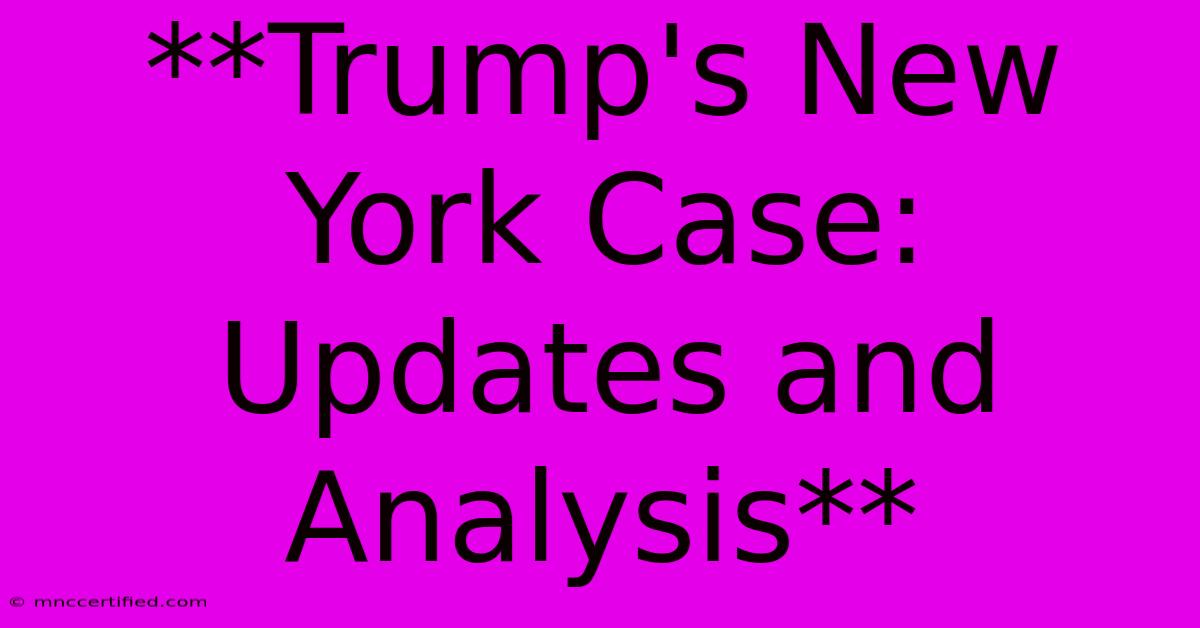**Trump's New York Case: Updates And Analysis**

Table of Contents
Trump's New York Case: Updates and Analysis
The legal landscape surrounding former President Donald Trump continues to evolve, with a recent Manhattan District Attorney investigation taking center stage. This article delves into the key updates and analysis of the ongoing New York case, offering insights into its potential implications.
The Charges: A Business Deal Gone Wrong?
The Manhattan District Attorney's investigation, led by Alvin Bragg, centers around allegations of financial fraud and misrepresentation tied to the Trump Organization's business dealings. The focus lies on a series of transactions involving the Trump Organization and its subsidiaries, including the purchase of the Trump National Golf Club in Westchester County, New York.
Prosecutors allege that the Trump Organization inflated the value of its assets to secure favorable loans and insurance policies, while simultaneously undervaluing assets for tax purposes. This alleged scheme, dubbed a "pattern of fraud," is at the heart of the case.
Key Players and Timeline
Key Players:
- Donald Trump: The former President, whose personal financial dealings are central to the investigation.
- The Trump Organization: Trump's family-run business empire, facing potential charges as an entity.
- Alvin Bragg: The Manhattan District Attorney, spearheading the investigation.
Timeline:
- 2019: The investigation begins under former DA Cyrus Vance Jr., focusing on Trump's personal finances and the Trump Organization.
- 2021: Alvin Bragg takes over as DA and continues the investigation.
- 2022: The grand jury hears evidence and issues subpoenas.
- 2023: Trump's former Chief Financial Officer, Allen Weisselberg, is convicted on multiple counts of tax fraud, with the potential for a prison sentence.
The Case's Potential Impact
The New York case holds significant implications for Donald Trump and his business empire. A conviction, particularly against the Trump Organization, could result in hefty fines and damage its reputation, potentially impacting its future business endeavors.
Furthermore, the case could have political ramifications. A guilty verdict against Trump could further fuel his political opponents and intensify the legal and political battles he continues to face.
Analyzing the Case's Strength
The case's strength depends on the evidence presented and the strength of the arguments by both sides. Key factors influencing the outcome include:
- The evidence: Prosecutors must demonstrate a clear and convincing pattern of fraudulent activity.
- The defense's strategy: Trump's legal team will likely focus on challenging the prosecution's evidence and arguing that the actions taken were not criminal.
- The jury's perspective: Ultimately, the jury will decide whether the prosecution has met the burden of proof beyond a reasonable doubt.
Looking Ahead: What's Next?
The case is still ongoing and could take months or even years to reach a conclusion. Several key developments will shape its trajectory:
- Trump's potential indictment: While no indictment has been issued yet, the possibility remains, and its timing remains uncertain.
- Trial proceedings: Should the case go to trial, it will involve selecting a jury, presenting evidence, and hearing testimony from witnesses.
- Potential plea deals: Both Trump and the Trump Organization could negotiate plea bargains to avoid a trial, potentially resulting in lesser charges or fines.
The Importance of Continued Monitoring
The New York case is just one of several legal challenges facing Donald Trump. It remains a key focal point, with its outcome potentially shaping the future of his business empire and political ambitions. Continued monitoring of this case is crucial to understanding its evolving dynamics and potential impact.

Thank you for visiting our website wich cover about **Trump's New York Case: Updates And Analysis** . We hope the information provided has been useful to you. Feel free to contact us if you have any questions or need further assistance. See you next time and dont miss to bookmark.
Featured Posts
-
Us Senate Now Gop What To Expect Next
Nov 07, 2024
-
What Insurance Covers Periodontal Disease
Nov 07, 2024
-
Investment Property For Sale Columbus Ohio
Nov 07, 2024
-
Flick Praises Pena Outlines Gavi Plan
Nov 07, 2024
-
Course Of Construction Insurance Coverage
Nov 07, 2024